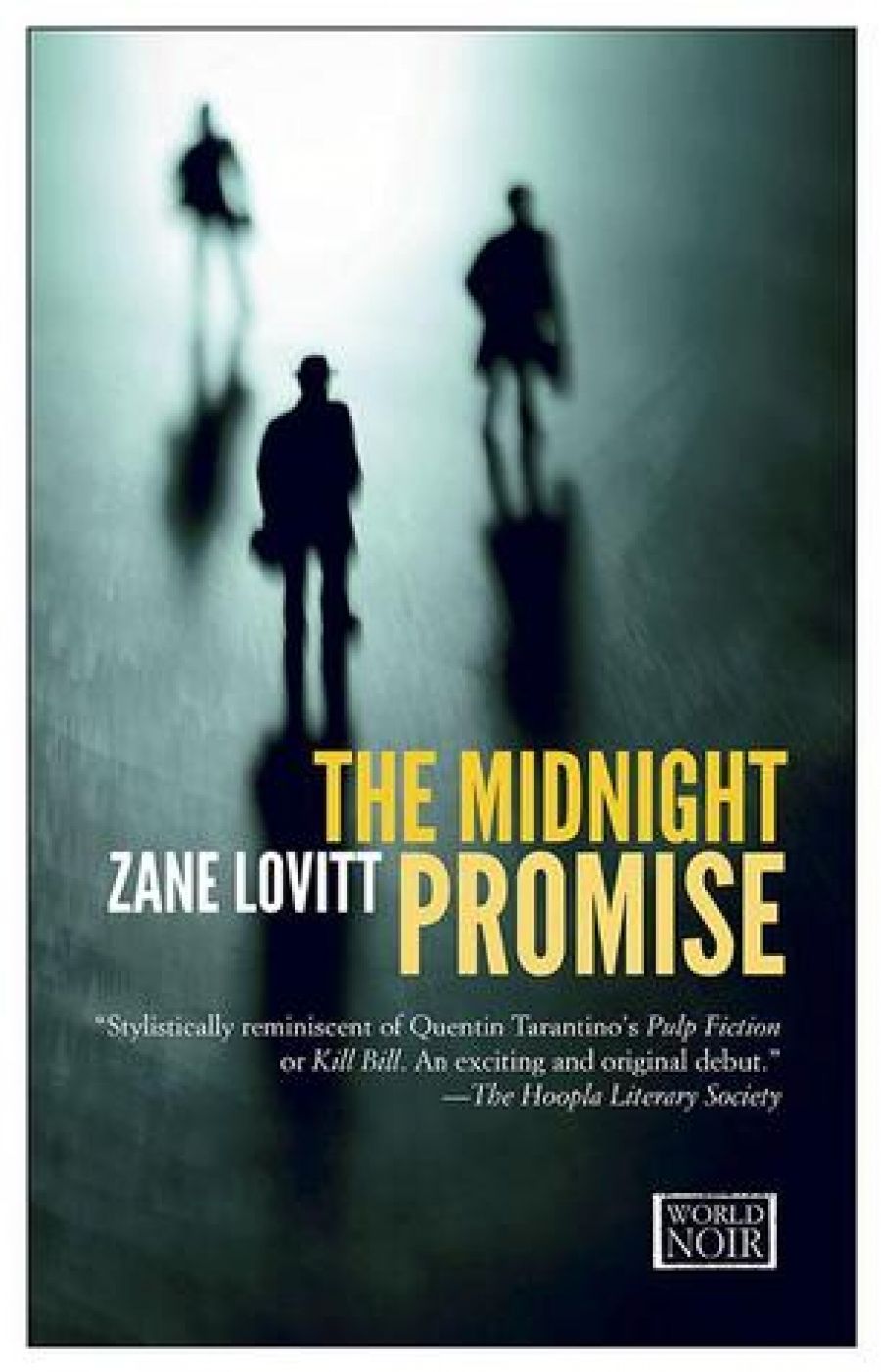
- Free Article: No
- Contents Category: Fiction
- Review Article: Yes
- Online Only: No
- Custom Highlight Text:
The Midnight Promise, Zane Lovitt’s début novel, is billed not as a detective story, but as a detective’s story. It is a minor grammatical change that makes for a major shift in the focus of the tale. Here there is no major dramatic revelation – no car chase, forensic science, femme fatale. Instead, the reader is offered a character study of a man slowly succumbing to depression, apathy, and alcoholism; worn down by his cases and by his inability to maintain his independence from them.
- Book 1 Title: The Midnight Promise
- Book 1 Biblio: Text Publishing, $29.99 pb, 283 pp, 9781921922930
The novel follows Private Inquiry Agent John Dorn across a series of investigations, but it begins with a prologue set many years after the events of the book that promises the reader two things: a certain degree of redemption, and the absolute need for it. These two ideas form the heart of the story. Dorn is a competent enough investigator and clings to his idealism, but his heart is not in the work, as is increasingly apparent. As he begins to make mistakes that other people must endure, Dorn becomes weighed down by his own perceived guilt and seems intent on self-sabotage, and it seems unclear what, if anything, will arrest his descent.
By splitting the novel into ten distinct cases, with few overlapping characters and only one recurring storyline, Lovitt maintains the focus firmly on his protagonist. Dorn spies, bugs offices, and stakes out houses, but he doesn’t appear to notice anything. His personal life is shambolic but barely touched upon. Dorn’s interest, and the author’s, lies in what happens after the investigative work is done, and the impact of his investigative work on the people involved, particularly himself. This idea is encouraged by a level of banality in the cases that is common in the Australian dramatisation of crime; there are no vast conspiracies or hidden relics, just infidelity and runaway children. But Lovitt has the sense to recognise that these small events can have a great impact on those involved, and the skill to make the reader care.
Each peripheral character appears only briefly, but many are memorable, and most come across as individuals in their own right, not just as supporting cast in the drama of John Dorn, thus creating the sense of a living world beyond the events of the novel. Dorn misjudges and misreads people, inspiring reactions far beyond what he seems to expect or hope for, and, rather than having an important role, often feels like an intrusion into their lives. Kiara, a primary school teacher involved in one case, is a striking example. Hurt and confused by Dorn’s presence, she compares him to her more trying students: ‘Six-year-old catharsis junkies.’
Dorn is not, by and large, a likeable character, but he is a captivating one; made more so by the quality of the writing. Told in the first person, the language and shape of The Midnight Promise mimics the disintegration of its protagonist’s personality and reinforces the impact of these changes. At the start of the book there is an optimism, quickly lost, that Dorn can make a positive difference for his clients, or at least avoid making a negative one. Humour also infuses the earlier stories. Halfway through the book this is gone. The fourth story is titled ‘The Death of Comedy’, and, while it directly refers to a character by that name, it is also a comment on Dorn himself; the final moments when he still has a sense of levity about what he’s doing – before self-pity and alcohol consume him. What humour is left in the remainder of the book is slim, and is tainted by anger and bitterness.
The prose in The Midnight Promise is clear and clever, but the reader is never drawn to examine an individual sentence; instead it does its job and allows the focus to stay entirely on the story itself. The frequent use of metaphor and symbolism is deft, often obvious only in retrospect. Where the symbolism is more direct, Lovitt couches it in the entertainingly excessive tones of the noir, amplifying the drama of simple events.
I wonder about the first drip, the first one to make the tin overflow, some time earlier tonight. At the moment it landed, when the water first crept out over the rim, maybe something coincided, like a car crash outside, or a thunderclap.
But what’s more likely is that there was nothing to announce it. And I wonder, even if I’d been sitting here watching, if I would even have realised it happened.
Despite a prologue that seems to give away the nature of the ending, the finale delights, managing to surprise in both content and execution. Lovitt has taken a risk that could easily have backfired, but the final page makes for an effective and compelling resolution to the story and takes advantage of literature’s unique emotional power.
Lovitt has crafted a notable, confident first novel. Intelligent, never ponderous, The Midnight Promise wears the battered fedora of the crime genre with stylish ease and moves at a brisk pace. Told with intensity and conviction, it offers a refreshing perspective on a well-worked genre.


Comments powered by CComment